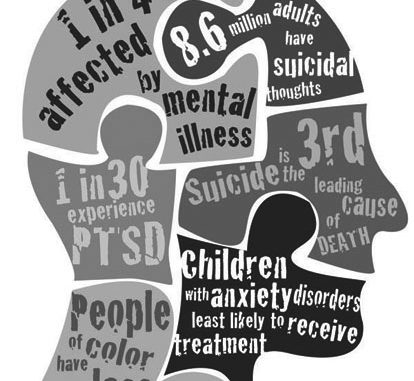
Rebecca Pollard, Culture Editor
During my four years at Shenendehowa High School, I was required to take just one health class for a single semester during my senior year. I remember being taught a lot about STI’s, all of the available types of contraceptive, pregnancy, the different types of drugs and their effects, and the risks of over-consumption of alcohol. I remember spending a less significant amount of time on eating disorders, and even less on the warning signs of possible suicidal peoples. In all of these topics, I do not recall the phrase “mental illness” being mentioned once.
ADHD, bipolar disorder, depression, PTSD, eating disorders, and OCD are just some of the many conditions that fall under the category of mental illness. There are millions of Americans affected by these various illnesses every year and unfortunately for them, many Americans are vastly under-educated on these conditions.
According to the National Alliance on Mental Illness (NAMI) approximately one in five adults in the U.S. experiences mental illness in a given year. That’s 43.8 million people, or 18.5 percent of the population. Yet oftentimes when people begin to suffer from these illnesses they are unaware of what is happening.
Mental illness, as defined by NAMI, is a condition that affects a person’s thinking, feeling, or mood. It can affect one’s capability to function in their daily life as well as their ability to relate to others, and can be caused by any number of factors.
“A mental health condition isn’t the result of one event. Research suggests multiple, linking causes. Genetics, environment, and lifestyle influence whether someone develops a mental health condition. A stressful job or home life makes some people more susceptible, as do traumatic life events like being the victim of a crime. Biochemical processes and circuits and basic brain structure may play a role, too,” as stated on the NAMI website.
During the second semester of my sophomore year, I was fortunate enough to study abroad in New Zealand, during which time my older sister was unfortunate enough to suffer through her first manic episode. She had been coming up with “theories” that didn’t make very much sense. Her eyes were noticeably clouded, even just over Skype, because she hadn’t been able to sleep for nearly a week. When talking to her, it was like she had lost the ability to listen. She was suffering from paranoia and advised me to stop using any and all face washes because she was convinced they were laden with toxins. She also took long periods to pause in conversation to attempt to collect her thoughts, usually without much success.
Not being there made it difficult to understand what was going on and what she was going through, but the main difficulty was how immensely naive I was about mental illness as a whole. I had heard of bipolar disorder before, but only in hushed whispers about distant “crazy” family members. I was immediately terrified once she was admitted to a mental institution and diagnosed with this disorder. Instead of thinking of it like a broken leg or strep throat, I thought of it with the negative stigma that many Americans attach to it.
Since then, I’ve learned that there is a negative stigma attached to it because people don’t understand that mental illness is not something that one can control. People tend to think of these conditions as managable because the issue is internal and mental rather than external and physical. When people cannot see something tangibly wrong with a person a block seems to form, one that says, “Can’t they just think normally?”
Here is my issue with the stigma; it’s incredibly ignorant. If depressed persons could switch their mindset to be happy, no one would be depressed. If those suffering from anorexia could eat, they would. If someone could choose not to have obsessive compulsive disorder, then no one would have it. Unfortunately, just because these illnesses are mental does not mean that people are able to control them without proper medications.
Ideally, mental illness will one day be regarded as any other sickness, free of stigma and negative connotations. The majority of mental illness can be managed under proper medication and/or treatment, but the road to recovery is a difficult one because these illnesses affect everyone differently. Because of this, people require different treatments and finding the correct one for each individual can be a tricky and frustrating process.
No one should feel ashamed or embarrassed for suffering from mental illness. These things are difficult enough to deal with without having to worry what others may think of them because of it. The issue with mental illness is not mental illness itself, it’s the silence our country has taken in education regarding an issue that affects millions of families.
Leave a Reply